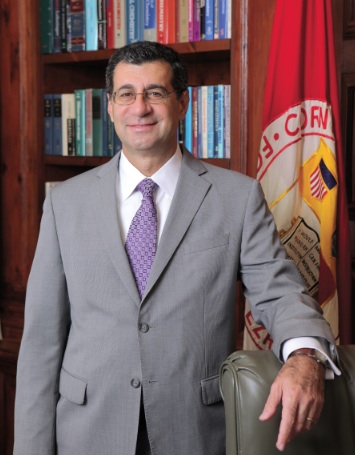Dr. David Hajjar to Work with Academic Leaders in Qatar
February, 2011

Dr. David Hajjar. photo by John Abbott
Dr. David P. Hajjar, professor of biochemistry, professor of pathology and laboratory medicine and dean of the Weill Cornell Graduate School of Medical Sciences, has been named to the Fulbright Specialist Program to work in Qatar to strengthen biomedical research.
Dr. Hajjar will work with Dr. Javaid Sheikh, dean of Weill Cornell Medical College–Qatar, and Dr. Kassim Ali Shaaban, dean of the College of Arts and Sciences of Qatar University, to strengthen the research and educational enterprise of Qatar University’s College of Arts and Sciences and to develop opportunities for collaborations between Weill Cornell Medical College–Qatar, Qatar University and others. In addition, Dr. Hajjar intends to help identify students at Qatar University who are interested in medicine and who would qualify for admission to the medical college in Qatar.
The Fulbright Specialist Program awards grants to U.S. faculty and professionals in select disciplines to engage in short-term collaborative projects at higher education institutions in over 100 countries worldwide.
"I applaud this important effort to forge new connections with Qatar University as we strive to realize the full potential of our institutions’ shared educational and research goals, and best prepare students to achieve their own aspirations in the fields of science and medicine," says Dr. Sheikh.
Dean Hajjar was nominated in 2010 for this honor by Dr. David J. Skorton, president of Cornell University; Sir Paul Nurse, president of Rockefeller University; and Dr. Barry Coller, physician-in-chief of Rockefeller University.
"Through his leadership in building our own research and education enterprise at Weill Cornell, and as an accomplished, brilliant scientist himself, Dr. Hajjar is uniquely qualified to offer expert guidance to our friends and colleagues in Qatar," says Dr. Skorton. "I extend my congratulations and wish him well in this important undertaking."
"Dr. Hajjar has extraordinary skills and will bring them to this important initiative which underscores Weill Cornell’s longstanding commitment to the people of Qatar. His work with academic leaders in Qatar, together with our broader, shared efforts in New York, will help to improve health outcomes in that country, the entire region and, indeed, the whole world," adds Dr. Antonio M. Gotto Jr., the Stephen and Suzanne Weiss Dean of Weill Cornell Medical College and provost for medical affairs at Cornell University.
"I look forward to working with Dean Hajjar and Dean Sheikh as we plot a course to establish strong collaborations within Qatar and internationally, connecting students and faculty with new opportunities for learning and advancing science," says Dr. Shaaban.
"It is a great honor to be selected for the Fulbright Program. My intent is to do something meaningful to bridge the educational and scientific endeavors of Qatar University with the medical sciences in Education City at Weill Cornell Medical College in Doha," says Dr. Hajjar.
Dr. Hajjar received his B.A. degree in 1974 from the American International College and the M.S. and Ph.D. degrees in biochemistry in 1977 and 1978, respectively, from the University of New Hampshire. He came to Cornell in 1978 as a research associate in biochemistry and pathology and was promoted to assistant professor in 1981, associate professor in 1984 and professor in 1989. In 1986, at the age of 33, he was awarded tenure, the youngest faculty member to be granted such an honor. In 1995, Dr. Hajjar became the founding director of the Center of Vascular Biology at the Medical College. In 1997, he was appointed dean of the Graduate School of Medical Sciences and the Frank H.T. Rhodes Distinguished Professor of Cardiovascular Biology and Genetics.
To date, he has published more than 160 research papers on the pathogenesis of heart disease. He is considered an international authority in this area of research and has received many honors from the American Chemical Society, the American Heart Association and the Federation of American Societies of Experimental Biology. Dr. Hajjar was appointed vice provost for the faculty in 2000, executive vice dean in 2003, and senior executive vice dean and executive vice provost of Weill Cornell Medical College in 2007. He remains the longest serving dean of the Graduate School (14 years) in its 60-year history.
